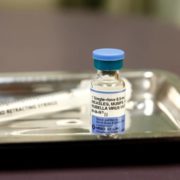The growing global trend of “anti-vaxxers” a main factor, CDC says
THE United States Centers for Disease Control (CDC) on Monday, May 27 reported 60 new cases of measles, making the total reported cases of the preventable-disease this year to 940 across 26 states.
This is the worst outbreak of measles since 1994 (which had a reported total of 958 cases) and since measles was officially eliminated in 2000, CDC officials said.
The states that have reported measles cases include Arizona, California, Colorado, Connecticut, Florida, Georgia, Illinois, Indiana, Iowa, Kentucky, Maine, Maryland, Massachusetts, Michigan, Missouri, New Mexico, Nevada, New Hampshire, New Jersey, New York, Oklahoma, Oregon, Pennsylvania, Texas, Tennessee, and Washington.
The resurgence of parents who distrust vaccinations and immunizations (also known as anti-vaxxers) are a principal reason for the re-emergence of measles in the United States, public health officials said.
The anti-vaxxer movement is characterized by fringe, but outspoken parents who falsely believe that the materials in vaccinations are a direct link to autism despite scientific research that disputes these claims.
A majority of those infected this year were people who were unvaccinated.
Measles is a serious and highly contagious viral disease that can be spread through coughing and sneezing. Typically, measles sufferers start with a high fever that evolves into a cough, runny nose and red eyes followed by a breakout of rashes throughout the body.
The disease can also evolve into pneumonia, brain swelling and, in severe cases, death.
According to the CDC, measles is so contagious that if one person is infected, 90% of people in the immediate vicinity of that person will become infected if they are not vaccinated.
The U.S. outbreak is a part of a global chain reaction where countries across the world are experiencing their own outbreak.
The Philippines is undergoing its own severe epidemic which began of January of this year. Measles was largely eradicated in the Philippines by 2004, but the virus has made a strong comeback within the last few months.
Since January, there have been more than 33,000 reported cases and 366 deaths from the preventable disease, making the country’s outbreak one of the worst in the world.
“There are multiple factors that may contribute to the low immunization coverage in the Philippines. Inadequate service delivery continues to be a concern, including less than optimal number of immunization sessions at the primary care level and accessibility issues especially in hard-to-reach areas in the Philippines,” the World Health Organization (WHO) said.
According to health professionals in the Philippines, the outbreak has been fueled by an uptick of anti-vaxxers and, consequently, the decline of childhood immunizations across the archipelago.
A recent study from the London School of Hygiene and Tropical Medicine found that Filipinos who believe “that vaccines are important, are safe and effective” dropped from nearly 100% in 2015 to about 60-80% in 2018.
The reason for the distrust in vaccinations could be a response to the dengue vaccination controversy of 2016 wherein a nationwide effort went underway to immunize children against dengue using a vaccine called Dengvaxia.
The campaign was suspended after the vaccine caused some children to contract severe or, in 10 cases, fatal dengue. The Philippine government brought criminal charges to officials who led the campaign and filed a suit against the pharmaceutical company Sanofi over the fatalities.
“The administration of dengue vaccine eroded vaccine trust,” Leonila Dans, a clinical epidemiologist at the University of Philippines Manila, told NPR, adding that this “exacerbated” the current measles epidemic and resulted in more parents opting out of routine immunizations for their children.
The Department of Health in the Philippines declared reported measles outbreaks in Metro Manila, Central Luzon, Calabarzon, Western Visayas and Central Visayas.
The Philippine government has since launched a nationwide campaign for measles vaccinations and hopes to immunize more than 20 million Filipinos — one fifth of the entire Philippine population — by September. About 5.5 million have been vaccinated so far, according to a report in NPR, which has slightly stifled the disease, but the country still sees hundreds of new cases.
The WHO and the CDC urge for all parents of young children to “fully” immunize their children, who need two doses of the measles vaccine. Public health officials recommend children get one dose between the ages of 12 months to 15 months and another dose between 4 and 6 years old.
Before traveling internationally, infants aged 6 to 11 months need one dose of the vaccine and children 12 months and older need two doses separated by 28 days at least.
For teenagers and adults who were not vaccinated or have no evidence of immunity against measles, the CDC recommends getting two doses (separated by 28 days) before travel. (Klarize Medenilla/AJPress)






